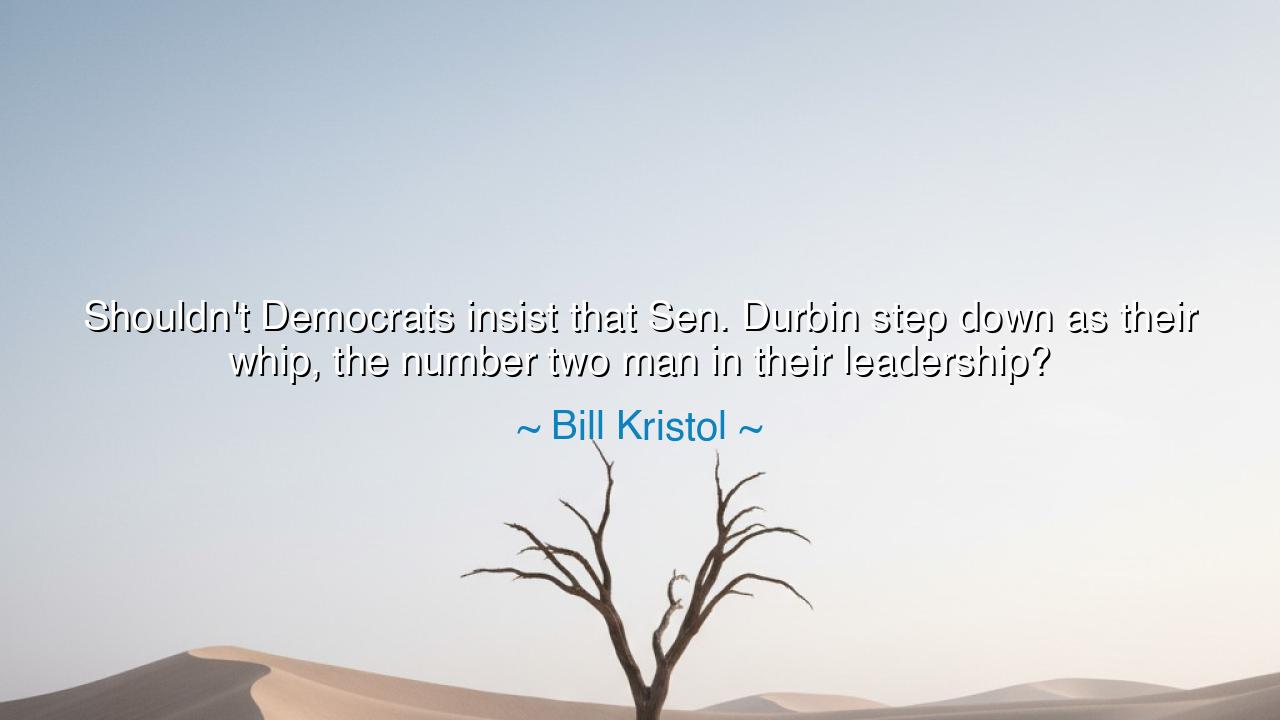
Shouldn't Democrats insist that Sen. Durbin step down as their
Shouldn't Democrats insist that Sen. Durbin step down as their whip, the number two man in their leadership?






The words of Bill Kristol strike like a challenge cast into the heart of political conscience: “Shouldn’t Democrats insist that Sen. Durbin step down as their whip, the number two man in their leadership?” Though spoken in the measured tone of commentary, this question carries the weight of moral judgment and the timeless theme of accountability. In its essence, it is not merely about a single man or party—it is about the ancient struggle between principle and power, between loyalty to truth and loyalty to tribe. Kristol’s question echoes across the ages, for every civilization must one day ask itself: shall we defend the integrity of our leadership, or shall we defend the leaders themselves?
To understand the meaning and origin of this statement, one must return to the political climate of 2005, when Senator Richard Durbin, a leading Democrat in the United States Senate, compared the treatment of detainees at Guantanamo Bay to the actions of oppressive regimes of history. His words ignited fierce controversy. Supporters saw a man daring to confront moral hypocrisy; critics saw a betrayal of national honor. It was in this storm that Bill Kristol, a conservative thinker and editor, posed his question—not as idle rhetoric, but as an examination of political virtue. When he asked whether Democrats should demand Durbin’s resignation from leadership, Kristol was, in truth, asking whether political loyalty had eclipsed moral responsibility.
This question transcends its moment. It speaks to an eternal tension within the governance of men—the temptation to protect one’s allies even when truth demands their rebuke. Throughout history, great nations have fallen not because their enemies were strong, but because their leaders refused to hold themselves to the same standard they demanded of others. In the ancient Roman Senate, when Julius Caesar defied the Republic’s laws, it was not his ambition alone that doomed the state—it was the silence of those who feared to oppose him. Bill Kristol’s words thus recall the wisdom of the ancients: that a nation is only as strong as its willingness to discipline its own.
His challenge also reveals a deeper truth about leadership—that moral authority cannot be sustained by title or position alone. To be a “whip,” as Senator Durbin was, is to be a guide and enforcer of discipline within one’s ranks. Yet how can one enforce integrity upon others if his own words or actions have cast doubt upon his judgment? Kristol’s question exposes the paradox of leadership: that those who command others must be the first to submit to principle. Just as the priest must live the creed he preaches, so too must the statesman embody the ideals of his office. When leaders fall short and remain unaccountable, their followers do not rise—they crumble.
We find this same lesson mirrored in the life of George Washington, who, after leading his army to victory, voluntarily laid down his power. He could have ruled as a king, yet he chose humility to preserve the Republic. In his self-restraint lay the moral foundation of a nation. Kristol’s question invites us to consider the opposite: what happens when leaders cling to authority even as controversy clouds their virtue? The decline of principle begins not with the wickedness of the few, but with the silence of the many who excuse it. A people that fears to question its leaders has already surrendered the noblest part of its freedom—the right to moral discernment.
Yet there is mercy in this reflection. Bill Kristol’s inquiry is not a call for destruction, but for purification. In every age, societies must test their leaders by fire, not to burn them, but to refine them. To insist on accountability is not cruelty—it is fidelity to truth. A party, a church, or a nation that holds its own to account becomes stronger, for it teaches its children that integrity is not a weapon to use against enemies, but a mirror in which all must see themselves. The true measure of greatness lies not in how one defends allies in error, but in how courageously one defends principle above personality.
So let us take from Kristol’s challenge a lesson for our own time. Whether in politics, business, or daily life, do not shrink from asking difficult questions of those in power—nor of yourself. When you see wrongdoing, do not veil it with loyalty; when you hear truth, do not silence it for comfort. For justice cannot live in a world of excuses. The heart of democracy—and indeed of all moral civilization—beats strongest when men and women remember that leadership is not a privilege to be protected, but a trust to be earned anew each day through honor, humility, and courage.
Thus, Bill Kristol’s words endure beyond the political tempest that birthed them. They call every generation to a higher form of citizenship—one that prizes truth above partisanship, and conscience above convenience. For nations, like souls, are saved not by their power, but by their integrity. And so the question still stands, echoing in every age and every heart: “Shouldn’t we insist that those who lead us be worthy of the power they hold?”






AAdministratorAdministrator
Welcome, honored guests. Please leave a comment, we will respond soon